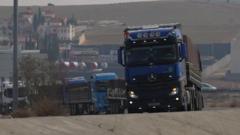On a bright winter morning, Mustafa al Qadri navigates through Jordan's rugged landscape, his eyes fixed on the long line of vehicles making their way toward the Jordan Valley. The convoy, laden with essential supplies for the besieged population of Gaza, prepares for the journey through Israeli customs at the King Hussein/Allenby Bridge border crossing before heading to the Erez crossing where the World Food Programme will take charge of the delivery.
Mustafa harbors a sense of joy even though his path leads him toward areas where roads are obstructed by Israeli settlers and where hijacking of aid trucks threatens operations. “We are carrying food and medication for our brothers in Gaza," he states, reflecting both a deep connection rooted in shared struggle and the prevailing humanitarian spirit. This mission involves 120 trucks, the largest such aid operation since the outbreak of conflict in October, signaling to Gazans that they have not been forgotten by their neighbors.
With strong public support for Gaza manifesting in dynamic scenes as the drivers beep their horns and wave to onlookers, the air is charged with solidarity. Jordan's King Abdullah II has advocated for increased humanitarian assistance, aligning the kingdom’s efforts with global calls to alleviate the catastrophic conditions in Gaza, where the U.N. reports that 90% of the population is displaced and reliant on aid.
Antonio Guterres, U.N. Secretary-General, highlighted the critical need for a ceasefire to remove obstacles blocking vital supplies from reaching those in dire need. Inflation and logistical hurdles have hindered aid delivery, exacerbating a dire humanitarian crisis that has unfolded over 15 months of turmoil. Amidst scenes of exhaustion, children in Gaza wait in long lines for food, with stories of resilience juxtaposed with the harsh realities of their situation.
Ten-year-old Farah Khaled Basal eagerly seeks sustenance for her nine siblings, while 16-year-old Lamees Mohammad Al Mizar'i shares her struggles with altered views on food in the face of hunger. Once discerning in her eating habits, Lamees now accepts whatever is available, underscoring the stark transformation wrought by the conflict. She embodies the tough choices families face, fearing that if she does not queue for food, they may go hungry.
Meanwhile, more aid is being prepared for future delivery to Gaza. The Jordanian Hashemite Charity Organisation reports they can mobilize 150 trucks a day for Gaza should permissions be granted. The collective readiness from local and international groups highlights the crucial need for peace and unrestricted access to aid for the besieged community in Gaza.



















